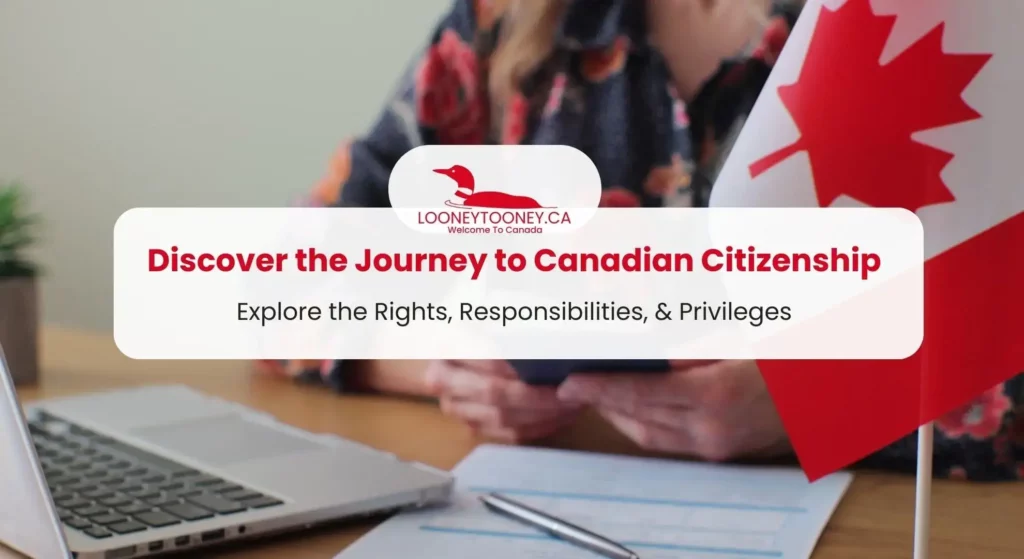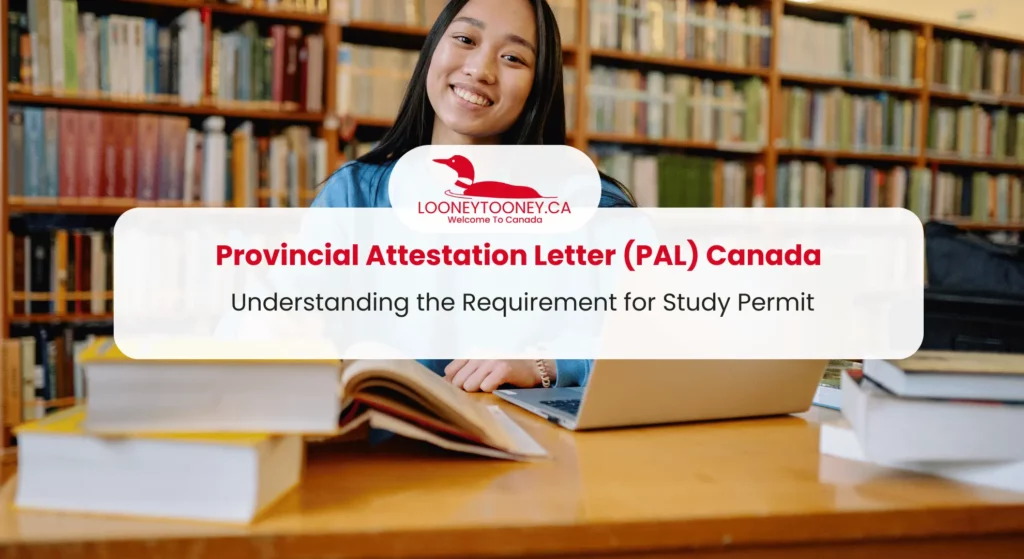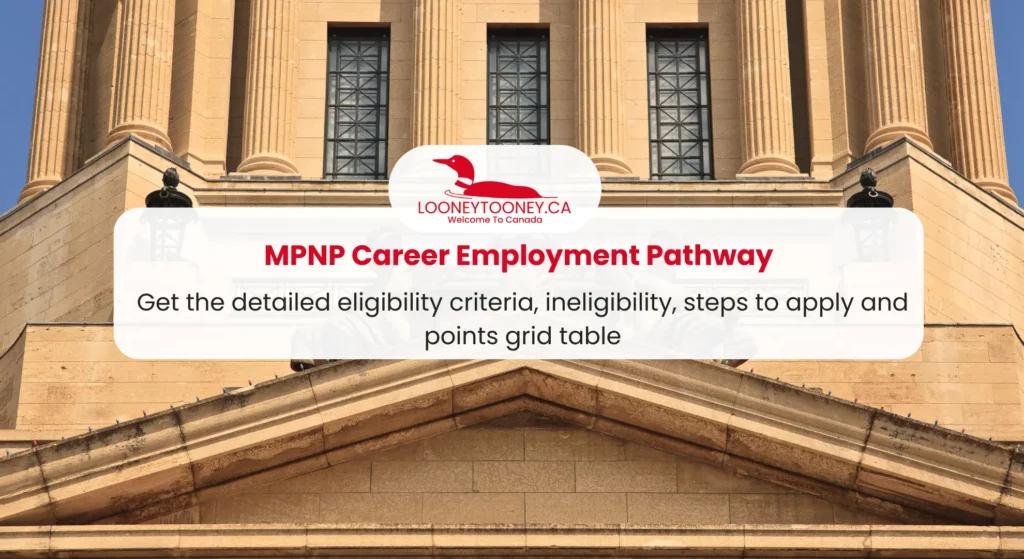Citizenship denotes an individual’s legal status within a country. In Canada, this status can be obtained through either birth or a process known as “naturalization.” Immigrants who choose to come to Canada and settle here, provided they meet the citizenship criteria, may become eligible to apply for Canadian citizenship through the naturalization process.
Canadian citizenship, as bestowed by the government of Canada, comes with specific rights and responsibilities. It grants individuals the official membership in the Canadian community, along with the privileges that accompany it. Having Canadian citizenship offers individuals the opportunity to build their lives and advance their careers in one of the most prosperous and successful nations in history.
Table of Contents
- Who is a Canadian Citizen?
- Canadian Citizenship Eligibility
- Application Canadian Citizenship: Step-by-Step Process
- Processing Your Application
- Canadian Citizenship Test and Interview
- Take the Oath of Citizenship at a Citizenship Ceremony
- Canadian Citizenship Processing Time
- What are the Rights and Responsibilities of Canadian Citizens?
- How do I Renounce Canadian Citizenship & Who is Eligible?
- FAQs on Canadian Citizenship
Who is a Canadian Citizen?
An individual can be considered a Canadian citizen under the following circumstances:
- Birth in Canada: If they were born in Canada.
- Naturalization: If they became a citizen through the process of naturalization.
- Canadian Parent: If they were born outside Canada, but at least one of their parents was a Canadian citizen at the time of their birth. This can occur because the parent was either born in Canada or underwent naturalization in Canada.
- Born Abroad (1947 – April 16, 2009): If they were born outside Canada on or after January 1, 1947, up to and including April 16, 2009, to a Canadian parent who was also born outside Canada to a Canadian parent.
- Adoption by a Canadian Parent: If they were adopted outside Canada by a Canadian parent on or after January 1, 1947.
Canadian Citizenship Eligibility
To attain Canadian citizenship, you are required to:
- Hold the status of a permanent resident.
- Reside in Canada for a period of at least 3 out of the last 5 years.
- Filed your taxes, if they apply to you.
- Prove your language skills.
- Pass a citizenship test.
- Take the oath of citizenship.
Different or additional criteria apply if you fall into one of the following categories:
- If you are applying for citizenship for a minor (under the age of 18).
- If you are a Canadian citizen applying for citizenship for your adopted child born outside Canada.
- Current or former Canadian Armed Forces (CAF) member applying through the fast-track process.
- Someone who was previously a Canadian citizen and wishes to regain their Canadian citizenship, which encompasses both current and former members of the Canadian Armed Forces (CAF).
Spouses of Canadian citizens
- Marrying a Canadian citizen does not grant you automatic citizenship.
- If you are the spouse of a Canadian citizen, you are obligated to fulfill the exact requirements as mentioned earlier, with no exceptions.
Children and grandchildren of Canadian citizens
- Having a Canadian parent or grandparent could potentially make you eligible for Canadian citizenship. Determine if you might qualify for Canadian citizenship.
- To confirm your eligibility, it is advisable to apply for a Canadian citizenship certificate.
Application Canadian Citizenship: Step-by-Step Process
To obtain Canadian citizenship through naturalization, the initial step involves immigrating to Canada as a permanent resident. Similar to all Canadian immigration programs, permanent residents need to fulfill a specific set of criteria to qualify for citizenship:
Starting from January 4, 2023, you have the option to select either an electronic citizenship certificate (e-certificate) or a paper certificate
Apply for Canadian Citizenship Online
To apply for Canadian citizenship online, follow these detailed steps:
Step 1: Gather the Necessary Documents
- Digital Citizenship Photo
- Captured by a commercial photographer in the last six months.
- File must be in JPEG, JPG, or JPEG 2000 format.
- The file must not exceed 4MB in size and the image must have dimensions of at least 420 x 540 pixels.
- Personal Identification
- Two pieces of valid ID.
- ID choices: PR card, bio page of passport or travel document, driver’s license, health insurance card, age of majority card, or senior citizen identification card.
- If using a foreign ID, provide a notarized translation if not in English or French.
- File format: JPG, JPEG, GIF, TIFF, PNG, BMP, or PDF.
- Maximum file size of 4 MB.
- Police Certificate
- You will require a police certificate if you spent 183 consecutive days or more in another country, aside from Canada, during the past four years since turning 18.
- Passport
- Upload the bio page of all passports or travel documents held in the last five years.
- Proof of Knowledge of English or French
- Required for applicants aged 18-54.
- You must meet the Canadian Language Benchmarks (CLB) Level 4 or higher in speaking and listening.
- Accepted proofs include results from an IRCC-approved test, proof from certain government-funded language training programs, or proof of secondary or post-secondary education in English or French.
Step 2: Pay the Application Fee
- Visit the official Government of Canada website.
- Navigate to Immigration and Citizenship > Pay Your Fees.
- Select your country of payment, then citizenship, then adult.
- Click “Get payment instructions.”
- Click “Pay My Fees online.”
- Scroll to the bottom and click “Go to option 2.”
- Select “Citizenship and then click “Continue.”
- Follow the instructions to pay the fee of CAD 630. Save the payment receipt.
Step 3: Create an IRCC Account
- Visit www.canada.ca.
- Go to Immigration and Citizenship > Citizenship > Apply for Citizenship > Eligible to Apply Online.
- Follow the prompts to create an account, enter your email address, and set up a password.
- Check your email for a verification code and enter it to activate your account.
Step 4: Submit the Application Online
- Sign in to your IRCC account.
- Fill in the online form, upload the required documents, and submit the application. You have 60 days to complete this process.
Filling Out the Application Form:
- Personal Information
- Enter your UCI, full name, gender, height, eye colour, date of birth, and birthplace, and select your marital status.
- Indicate if you’ve changed your name, gender, or date of birth, and upload any supporting documents if necessary.
- Contact Information
- Enter your home and mailing addresses, phone numbers, and details of anyone assisting you with the application.
- Upload Documents
- Upload the citizenship photo, ID, police certificate (if required), proof of language proficiency, and passport bio pages. List all your addresses.
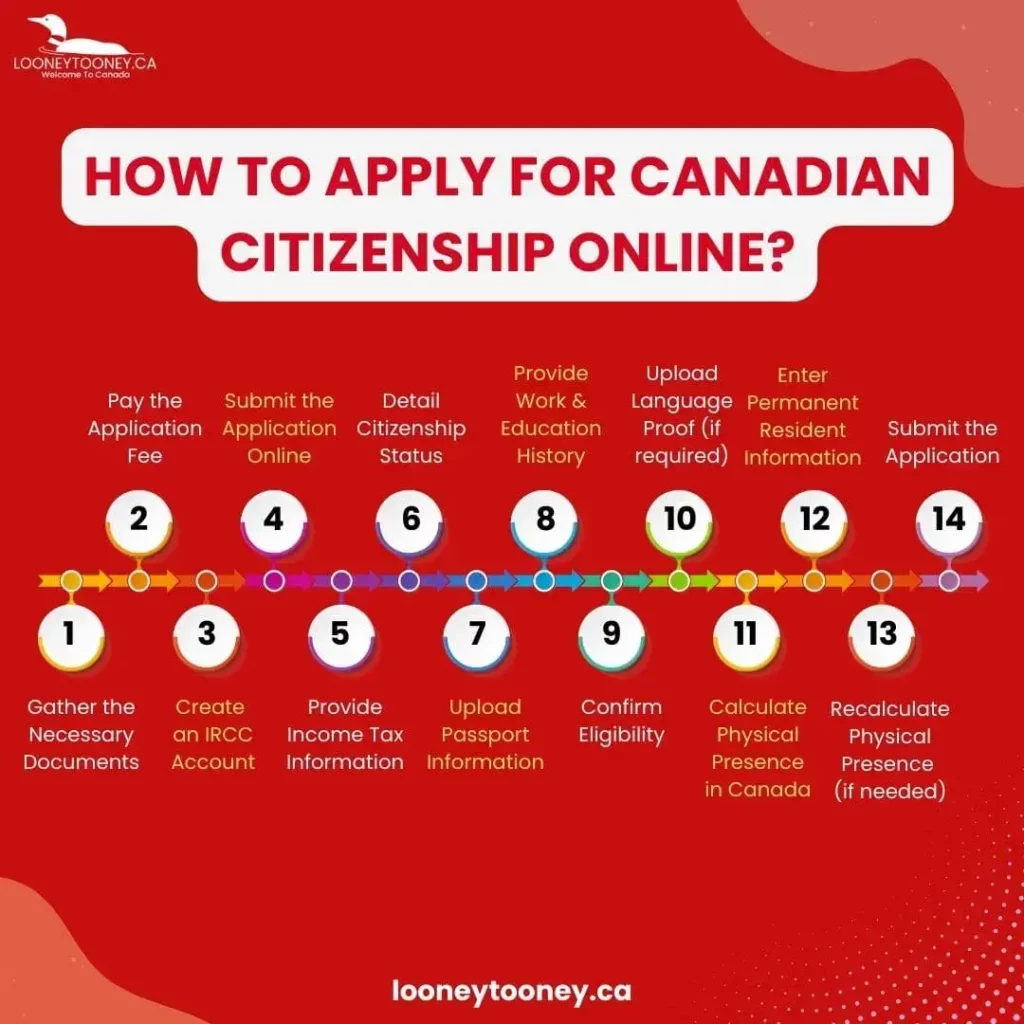
Step 5: Provide Income Tax Information
- Enter your Social Insurance Number (SIN).
- Confirm that you have filed taxes for at least three years within the past five years.
Step 6: Detail Citizenship Status
- List any other citizenships or immigration statuses held, including dates and relevant documents.
- Ensure that all data is current and precise.
Step 7: Upload Passport Information
- Upload bio pages of all current and previous passports or travel documents held in the past five years.
- Ensure the documents are clear and legible.
Step 8: Provide Work and Education History
- List all employment and educational activities, including English or French language training inside or outside Canada, for the past five years.
- Review your address, work, and education history to ensure there are no gaps.
- Correct any discrepancies before submitting your application.
Step 9: Confirm Eligibility
- Answer all eligibility questions to confirm you are not prohibited from obtaining citizenship under the Citizenship Act.
- Review your answers carefully to ensure accuracy.
Step 10: Upload Language Proof (if required)
- Upload proof of language proficiency if you are between 18 and 54 years old.
- Ensure the document is clear and legible.
Step 11: Calculate Physical Presence
- Use the physical presence calculator to ensure you have spent at least 1095 days in Canada in the past five years.
- You must have at least 730 days as a permanent resident. You can also count the time when you held a valid temporary resident or protected person status.
Step 12: Enter Permanent Resident Information
- Provide the date you became a permanent resident.
- Ensure this information matches your official records.
Step 13: Recalculate Physical Presence (if needed)
- Recalculate your physical presence if there are any errors or discrepancies.
- Make sure you fulfill the minimum requirement of 1095 days.
Step 14: Submit the Application
- Review all entered information and uploaded documents.
- Ensure everything is accurate and complete.
- Sign your online application by entering your name and the city where you will submit the application.
- Then, click the privacy notice and click “Confirm and Submit”
- Submit the application online and await confirmation from IRCC.
You can download a copy of your Canadian Citizenship online application for your records.
Apply on Paper
If you prefer to apply on paper, follow the steps below to complete and submit your application:
Step 1: Determine Your Physical Presence in Canada
You (and in certain cases, minors if applicable) must have been physically present in Canada for a minimum of 1,095 days (equivalent to three years) within the five-year period preceding the date you sign your application.
Step 2: Get an Application Package
The application package comprises an instruction guide and all the necessary forms for you to complete. Utilize the instruction guide and the document checklist to ensure that you don’t overlook any requirements.
Select the appropriate application package based on your specific circumstances:
- Adult (age 18 or older)
- Parent or guardian applying for a minor (under age 18)
- Minor without a Canadian parent applying alone
- Adult who served with the Canadian Armed Forces
- Adoption by a Canadian citizen
- Stateless person born to a Canadian parent
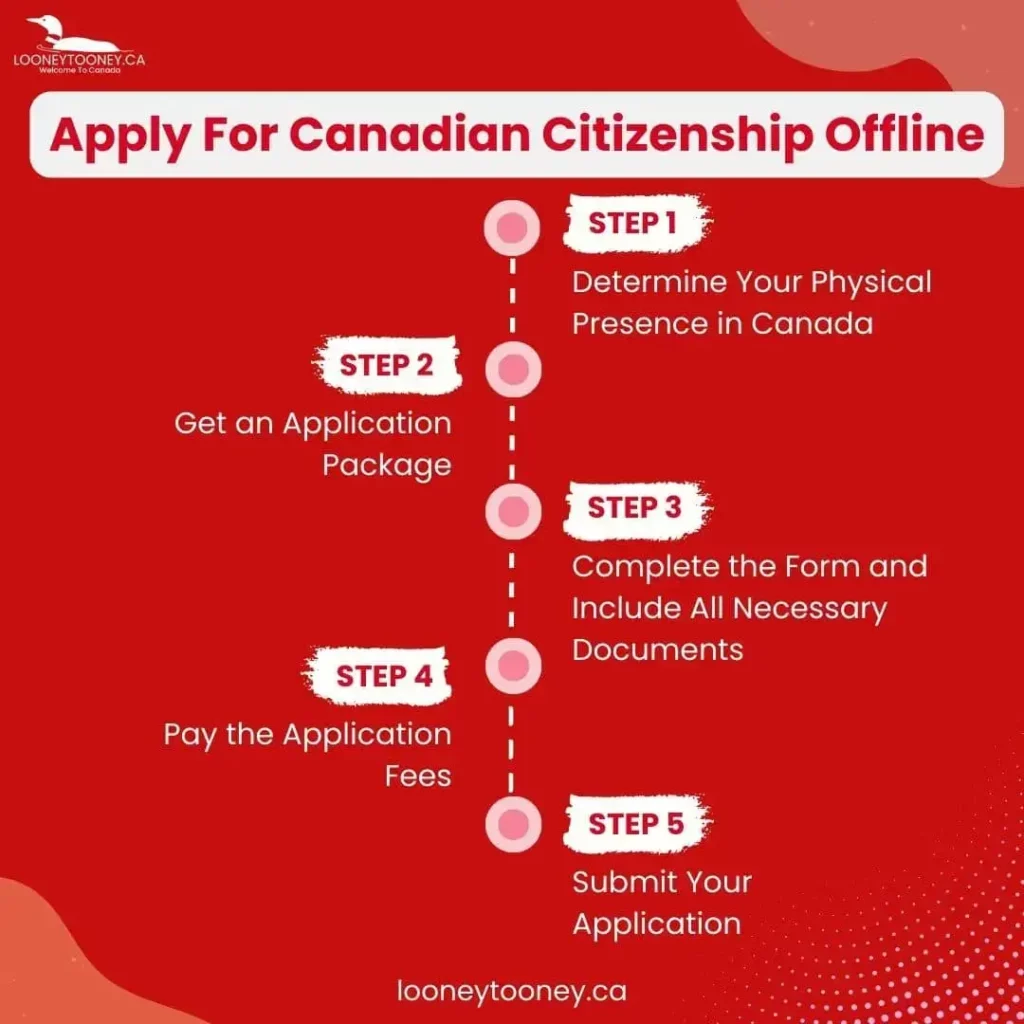
Step 3: Complete the Form and Include All Necessary Documents
Check that your application is all set before you send it. An incomplete application will be returned to you, resulting in delays in the citizenship process, as you will need to resubmit your application.
To prevent this issue, kindly adhere to the following steps:
- Fill out the application form completely; if a question does not apply to you, write “n/a.”
- Sign your application.
- Pay the appropriate fee.
- Include two certified citizenship photos.
Attach all required supporting documents and translations if needed. Essential supporting documents may include:
- Copies of your immigration documents (Record of Landing, Confirmation of Permanent Residence, or PR Card).
- Evidence of language proficiency.
- Copies of your passport and/or travel documents.
- School records.
- Two pieces of photo identification.
- Proof of fee payment.
- A copy of your Residence Calculator results.
Step 4: Pay the Application Fees
The fees you owe depend on whether you are an adult (18 and older) or a minor (under 18). These fees may cover:
- Processing fee
- Right of citizenship fee
You must make your payments online.
Only pay your fees when you are ready to send in your application. Be sure to include the payment receipt with your application. If you’re submitting multiple applications at once, you have the choice to pay all the fees together with one receipt or separately with multiple receipts.
Here is a summary of the citizenship application fees:
| Application | $CAN |
| Adult (18 and over)Processing fee ($530) and right of citizenship fee ($100) | $630 |
| Minor (under 18)Processing fee ($100) | $100 |
Step 5: Submit Your Application
To be eligible for Canadian citizenship, you need to meet the eligibility criteria on the day preceding the date you sign the application form.
Please ensure the following:
- Sign the application form.
- Date the form on the same day you sign it, avoiding dates in the past or future.
- Match the date of your signature on the application form with the “Application date” in the physical presence calculation for the following types of applications:
– Adults (18 years or older).
– Minors (under 18) without a Canadian parent applying alone. - Send your application promptly after signing and dating the form.
If IRCC receives your application more than 90 days after the date on the form, it will be returned to you.
Note: If you are submitting multiple applications, ensure that each application is fully filled out. Please note that if any of the applications are incomplete, IRCC will return all of them to you.
If you prefer to have all the applications processed together, place all the applications and their respective receipts in a single envelope. Otherwise, they will be processed separately.
Mail or courier your fully filled-out application form along with all the required documents included in the application package.
| Regular mail | Courier |
| Case Processing Centre – Sydney Citizenship Grants P.O. Box 7000 Sydney, NS B1P 6V6 | IRCC Digitization Centre – Citizenship 3050 Wilson Ave New Waterford, NS B1H 5V8 |
Processing Your Application
Upon receiving your citizenship application, IRCC conducts a thorough review to ensure that:
- All questions on the form have been answered.
- All necessary documents have been included.
- The required fees have been paid.
Check and update your application
You have the option to verify the status of your application online.
- Check out the progress with your application
- However, this is only possible after you have received an acknowledgment of receipt (AOR) letter or email.
– You will receive an AOR after they have received your application and confirmed its completeness.
Please be aware that there may be a delay before you receive this acknowledgment. Due to the impact of COVID-19, it may take more time to:
- Confirm the completeness of your application.
- Send an AOR letter or email containing your application number.
IRCC may contact you for additional information if your case is non-routine.
Canadian Citizenship Test and Interview
The need to undergo testing and attend an interview depends on your age and the specifics of your application.
| Your age and situation | Take the test | Go to the interview |
| Adult 18 to 54 years of age | Yes | May invite you to an interview |
| Adult 55 and over | No | May invite you to an interview |
| Minor under 18 with a Canadian parent or a parent applying at the same time | No | No, except in some cases* |
| Minor 14 to 17 without a Canadian parent or a parent applying at the same time | No | May invite you to an interview |
| Minor under 14 without a Canadian parent or a parent applying at the same time | No | No, except in some cases* |
*IRCC will request a minor to attend an interview only when they have particular inquiries. During the interview, both the minor and the individual who submitted the application on behalf of the minor must be present.
What Does the Test Cover?
The test assesses your knowledge of Canada. You will be asked 20 questions related to the rights and responsibilities of Canadians, as well as Canada’s:
- History
- Geography
- Economy
- Government
- Laws
- Symbols
These questions are derived from the official citizenship study guide, “Discover Canada: The Rights and Responsibilities of Citizenship.” It’s important to note that the citizenship test is not used to evaluate your language proficiency in English or French.
Get Your Test and Interview Date
You might receive an invitation to take the citizenship test a few weeks after IRCC sends you the acknowledgment of receipt (AOR) letter. Approximately 1 to 2 weeks before the test, you will receive a notice specifying the date, time, and location.
When you attend your test, ensure you have the following items with you:
- Notice instructing you to take the test (“Notice to Appear”).
- Your permanent resident (PR) card if you possess one.
- Two pieces of personal identification (ID).
– One piece of ID with both your photograph and signature, such as a driver’s license or health card.
– For foreign ID documents, they must be government-issued (Canadian ones don’t require government-issued).
– If the ID documents are not in English or French, include a translation along with an affidavit from the translator. - All your passports and travel documents, both current and expired, as listed on the application form.
- A certificate, diploma, degree, or transcript demonstrating your English or French language skills (if you were between 18 to 54 years of age when you signed your application).
- Any other documents specified in your “Notice to Appear” letter.
Taking the Test
The test is administered in either English or French and consists of the following characteristics:
- It lasts for 30 minutes.
- There are 20 questions.
- The questions are of the multiple-choice and true or false type.
- To pass the test, you need to provide 15 correct answers.
Normally, the test is in written form, but there is a possibility it could be conducted orally. On the day of the test, a citizenship official may determine that you should undergo an oral test rather than a written one. The choice of test format is influenced by several factors. For instance, if you encounter difficulties with reading and writing in English or French, you will be assigned an oral test, which will be conducted by a citizenship official during a hearing.
In certain instances, the hearing will occur on the initially scheduled test date. However, in the majority of cases, it will be scheduled for a date 4 to 8 weeks after the original test date. If the hearing is scheduled for a later date, IRCC will provide you with a notice specifying the date, time, and location.
After the Test
After the test, there will be an interview with a citizenship official. During this interview, the citizenship official will:
- Provide you with the results of your test if applicable.
- Assess your language skills, especially if you are between 18 and 54 years old.
- Examine your application and original documents.
- Address any questions they may have regarding your application.
- Make sure that you meet all the requirements of citizenship.
If you pass the test and fulfill all other citizenship requirements, they may:
- Provide you with a ceremony date at the same time they give you the test results.
- Send you an email or letter containing the date and time of your ceremony.
What Occurs If You Fail Your Initial Test
If you do not succeed in your initial written test but satisfy the remaining citizenship requirements, they will arrange a second test for you. Typically, the second test is scheduled for a period of 4 to 8 weeks after the first one, although it may take longer.
If you don’t pass the second test, you will receive a notice instructing to attend a hearing with a citizenship official. This hearing:
- Lasts for a period of 30 to 90 minutes.
- Can take place either in person or through a videoconference.
- Could be utilized to evaluate one or more citizenship requirements, such as knowledge of Canada or language proficiency.
If you are unsuccessful in passing the test after three attempts, your application will be declined. You have the option to reapply for another attempt.
When you apply with your family, they handle all the applications together. In case you need to retake the test or attend a hearing, your family may receive invitations to a ceremony before you do. If you prefer to continue processing all the applications together, you can request IRCC to temporarily halt your family’s applications. IRCC will wait until you meet all the requirements, ensuring that the entire family can participate in the same citizenship ceremony and become citizens simultaneously.
Take the Oath of Citizenship at a Citizenship Ceremony
Participating in a Citizenship ceremony and taking the Oath of Citizenship is the last stage in your journey to become a Canadian citizen. These ceremonies are held across the country and throughout the year, with special events on Canada Day and during Citizenship Week.
Who has to Take the Oath?
- Adults and individuals aged 14 or older are obligated to attend the citizenship ceremony and take the oath.
- Parents will receive certificates of citizenship for their children who are under 14 years of age. While it’s not mandatory for children under 14 to attend, they are certainly welcome to do so.
Get Your Citizenship Ceremony Date
Typically, the ceremony is scheduled for 4 to 6 months following your successful completion of the citizenship test.
However, if you have passed the test and did not receive the ceremony invitation within 6 months, this may indicate that your application falls under non-routine circumstances. In such cases, they may require additional information, documents, or extra time to assess your application thoroughly.
Approximately 1 to 2 weeks before the ceremony, you will receive the invitation, which will include details such as:
- Date and time of the ceremony.
- Zoom link (for a video oath ceremony).
- Location (for an in-person ceremony).
The majority of applicants are typically invited to participate in a video oath ceremony.
It’s advisable to regularly check the status of your application. If the “Citizenship ceremony” section of the Canadian citizenship status tracker shows an “In progress” status, it signifies that:
- Your ceremony has been scheduled.
- The invitation is en route to you via email or mail.
What to Bring to the Ceremony?
When attending the ceremony, ensure you have the following items with you:
- Ceremony notice
- Signed copy of the Permission Release and Consent form, which is included with the notice.
- PR card if you have one (even if it’s expired) or Confirmation of Permanent Residence (IMM5292 or IMM5688)
- If you became a permanent resident before June 28, 2002, bring your Record of Landing (IMM 1000).
- Two pieces of personal identification (ID).
– One piece of ID must feature both your photograph and signature, such as a driver’s license, health card, or PR card.
– Foreign ID documents must be government-issued, while Canadian ones do not require government-issued status.
– If they are not in English or French, you must provide a translation along with an affidavit from the translator.
– Minors are not obligated to provide identification with a signature. - All your passports and travel documents, both current and expired, that were listed on the application form.
What Occurs During the Ceremony?
During the ceremony, you will:
- Take the Oath of Citizenship
- Get your citizenship certificate
- Sign the Oath or Affirmation of Citizenship form
- Sing the national anthem, O Canada
Many individuals will take the oath alongside you. The ceremony official will say the oath in both English and French and as a group, you will repeat the words of the oath after the official. While it is mandatory to repeat the oath in at least one of the official languages.
You have the choice to swear or affirm the oath. Swearing is for those who wish to reference their religious beliefs while affirming is for those who do not wish to refer to religious texts. If you intend to swear the oath on your holy book, you need to bring it with you.
Upon taking the Oath of Citizenship, you will officially become a Canadian citizen. IRCC will provide you with a citizenship certificate as evidence of your Canadian citizenship, displaying the date when you attained citizenship. Ensure to store it securely.
Canadian Citizenship Processing Time
The processing time for Canadian citizenship applications typically spans around 8 months. This timeframe reflects the average duration, beginning from the moment a complete application is received by the relevant immigration authorities to the point when a final decision is made regarding the applicant’s citizenship status.
During this period, several crucial steps take place. Overall, the 8-month processing time reflects the thoroughness of the evaluation process and the commitment to ensuring that all applicants meet the criteria for Canadian citizenship before conferring this significant status.
What are the Rights and Responsibilities of Canadian Citizens?
Canadian citizens hold both rights and responsibilities, which are deeply rooted in their history, protected by Canadian law, and reflect their shared traditions, identity, and values. The Charter tries to explain basic freedoms and also mentions more rights. The most important ones are:
- Mobility Rights: Canadian citizens have the right to live and work anywhere they choose in Canada, enter and leave the country freely, and apply for a passport.
- Aboriginal Peoples’ Rights: The Charter’s guarantees will not have a detrimental impact on the rights or freedoms of Aboriginal peoples, including any treaties.
- Official Language Rights and Minority Language Educational Rights: Both French and English have equal status in Parliament and throughout the government.
- Multiculturalism: A fundamental characteristic of Canadian heritage and identity. Canadians celebrate the gift of one another’s presence and work diligently to respect pluralism and live in harmony, balancing rights and responsibilities.
Citizenship Responsibilities
In Canada, rights are accompanied by responsibilities. These responsibilities include:
- Obeying the law: Canada’s core principle is the rule of law, where individuals and governments are bound by laws rather than arbitrary actions. No one, whether an individual or a group, is exempt from legal obligations.
- Taking responsibility for oneself and one’s family: Securing employment, providing for one’s family, and contributing diligently to the best of one’s abilities are fundamental Canadian values. Work not only fosters personal dignity and self-respect but also contributes to Canada’s overall prosperity.
- Serving on a jury: When summoned, you are obligated by law to fulfill this duty. Serving on a jury is a valuable privilege that contributes to the functioning of the justice system, as it relies on unbiased juries composed of ordinary citizens.
- Voting in elections: While you have the right to vote in federal, provincial or territorial, and local elections, it is also your responsibility to actively participate in the democratic process by casting your vote.
- Helping others in the community: Millions of volunteers generously offer their time and skills to help others without compensation. Whether it involves aiding those in need, supporting your child’s school, volunteering at a food bank or charity, or facilitating the integration of newcomers, volunteering is an excellent way to develop useful skills and foster social connections.
- Protecting and enjoying our heritage and environment: Every citizen bears the responsibility of minimizing waste and pollution while safeguarding Canada’s natural, cultural, and architectural heritage for the benefit of future generations.
How do I Renounce Canadian Citizenship & Who is Eligible?
When you voluntarily give up your Canadian citizenship, you forfeit all the entitlements and benefits associated with being a Canadian citizen, leaving you without any legal status in Canada. Consequently, if you intend to come back to Canada with the intention of permanent residency, you’ll need to submit an application for a permanent resident visa. If your plans involve a temporary return to Canada, whether for visiting, working, or studying, you will need to apply for a temporary resident visa, if it applies to your situation.
In order to meet the eligibility criteria for applying to renounce your Canadian citizenship, you must:
- Be a citizen of a country other than Canada, or commit to becoming a citizen of another country if your application to renounce is approved
- Reside outside of Canada.
- Be at least 18 years old.
- Pose no threat to Canada’s security, and not be involved in a recurring pattern of criminal activities.
- Not having a mental disability that would prevent you from comprehending the significance of renouncing your Canadian citizenship.
- Not currently undergoing citizenship revocation proceedings.
FAQs on Canadian Citizenship
Below, you will find common questions and their corresponding answers regarding Canadian Citizenship:
Q. Is it possible to obtain Canadian citizenship without initially acquiring PR status?
A. To attain Canadian citizenship, individuals must initially immigrate to Canada as Permanent Residents (PR) and fulfill the citizenship prerequisites before proceeding to become Canadian citizens.
Q. Can I keep dual citizenship in Canada?
A. Yes. Canada acknowledges dual citizenship, permitting new citizens to retain their previous nationality. Nonetheless, permanent residents aspiring to acquire Canadian citizenship should confirm whether their current home country recognizes dual or multiple citizenship.
Q. Can Canadian citizenship expire?
A. No, Canadian citizenship never expires. You don’t need to renew it, and there are no minimum residency requirements to maintain your status.
Q. How long must I wait before applying for Canadian citizenship?
A. To be eligible for Canadian citizenship, permanent residents must have lived in Canada for at least 1,095 days within the five years prior to their application. In some exceptional situations, individuals who don’t meet this residency requirement may still be granted citizenship. Children under 18 are exempt from this requirement.
Q. Can Canadian citizenship be revoked or lost?
A. Under the Canadian Citizenship Act, the government has the authority to revoke an individual’s citizenship if it was acquired through misrepresentation, fraud, or the deliberate concealment of important facts.
You may also be interested in:
- Where to Live in Toronto?
- Affordable Short Term Rentals Toronto
- Best Neighborhoods in Mississauga, Ontario
- Spousal Sponsorship to Canada: Eligibility, Process and More
We believe this article on “Canadian Citizenship” has equipped you with valuable knowledge. If you are eager for more Canadian news and updates, stay tuned to LooneyTooney.ca. Get ready to stay in the loop with the freshest updates and insights!

